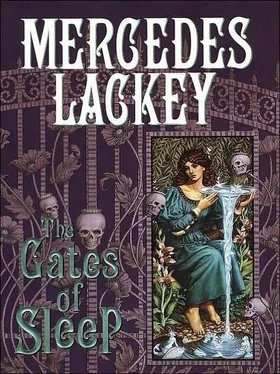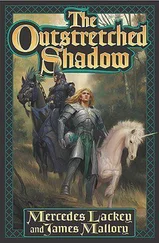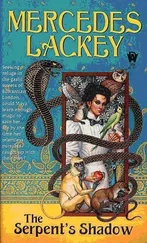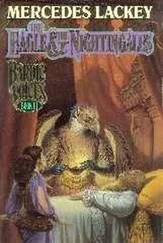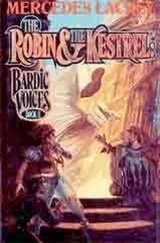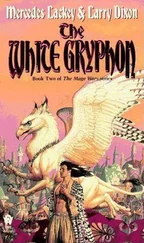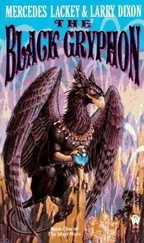“Oh! Well, then you’ll do all right,” the woman laughed. She unhooked the basque and handed the garment to Marina, who put it on, hooked the front back up again, one little steel hook at a time, and turned her back so that the seamstress could tighten the laces. “You’ll be doing this with the wall-hook I told you about, miss,” the modiste said, deftly pulling the laces tight, but not uncomfortably so. “Just have someone put one into a beam, and you won’t need a lady’s maid.”
When the woman was done, it felt rather like she’d been encased in a hard shell, or was wearing armor. It wasn’t uncomfortable, in fact, it made her back feel quite nicely supported, but she definitely wouldn’t be able to run in a garment like this. But a glance at the mirror showed a gratifyingly slim figure, and if she didn’t have a fifteen-inch waist, she didn’t particularly want to look like a wasp, either.
The seamstress, measuring tape and notebook in hand, went to work.
She was very thorough. She measured everything three times, presumably to make sure she got the measurement right, and it seemed as if she measured every part of Marina’s body. Wrists, the widest part of the forearm, biceps, shoulder-joint, neck. From shoulder to shoulder across the back and across the front. Bust, under the bust, waist, hips, just below the hips. From nape to center of the back. From nape of the neck to the ground. She even measured each calf, each thigh, and each ankle, though Marina couldn’t imagine how she’d use those measurements, and said so.
“It all goes in my book, my dear,” the woman told her. “Some day you might want a cycling costume, for instance, and I’ll have the measurements right here.”
Marina couldn’t think of anything less likely, but held her peace as the seamstress unlaced her corset and helped her out of it. For the first time she realized just how very comfortable her aunt’s gowns were.
But she still wanted that suit. Already in her mind, she was planning the trimming that she and her aunt would put on it. Black, of course—black would look wonderful on the gray wool.
She paid for the brown wool herself, out of the pocket-money her parents had sent before they went to Italy. After a quick survey of the street to make sure that Margherita was not on the way, she hurried across to the inn and hid her purchase under the old rugs they kept in the pony cart in case it became too cold. Then she hurried back to the seamstress, and was looking over sketches of garden-party dresses when her aunt returned.
“Well, how did it go?” Margherita asked.
“I’m finished,” Marina said, with triumph. “Look, this is what I picked—without the trimming. I have some ideas—”
“Hmm! And so do I! That’s a fine choice of design. Well done, poppet!” Marina beamed in Margherita’s approval. “When should we return for the fitting?” she asked, turning to the seamstress.
“Not sooner than a week,” the woman replied promptly. “Now, that suit rightly needs a shirtwaist—did you have anything in mind for that?”
“This, I think,” Margherita told her, turning back to the shirtwaists and pointing out a simple, but elegant design with a high collar and a lace jabot that could be tied in many ways, or left off altogether. “Two in white cambric, and one in dove-gray silk, and we’ll want enough extra fabric to make three jabots for each.”
Marina stared. “But—Aunt—I thought my old shirtwaists—”
“Nonsense, a new suit demands new shirtwaists.” Margherita bargained again, but with the unexpected sale of the brown wool plush, the seamstress was feeling generous, and let her have her way after only a token struggle.
They left the shop arm-in-arm and headed up the street. “Luncheon first, I think,” Margherita said, steering Mari in the direction of a teashop. “It’s our day out, and I think we’ll spend it like ladies. A proper lady’s luncheon, and none of those thick ham-and-butter sandwiches your uncles want!”
Marina giggled, but wasn’t going to argue. She could count the number of times she’d eaten in a teashop on the fingers of one hand; it was a rare treat, and she was bound to enjoy it.
“Well, Mari, are you happy with your present?” Margherita asked, when they were settled, with porcelain cups of tea steaming in front of them, and a tempting selection of dainty little sandwiches arranged on a three-tiered plate between them.
“Oh, Aunt—” Marina sighed. “I can’t tell you how much!”
Margherita just smiled. “Well, in that case, I think we should complete the job. What do you say to a new hat, gloves, and shoes to go with it all? Your mother sent a real surprise, but I’ve hidden it, and you’ll just have to wait.”
Marina had no thoughts for future surprises in the face of present generosity. “But—Aunt Margherita—isn’t all that—expensive?” she faltered.
Margherita laughed. “All right, I’ll confess. This year I finally convinced your mother to entrust the purchase of at least some of your Christmas presents to me. Oh, don’t worry, you’ll be able to give your Uncle Sebastian his usual largesse of painting supplies, but I pointed out, providentially it seems, that you were getting older and probably would start to need a more extensive wardrobe than I could produce. And that your mother, not being here, could hardly be expected to purchase anything for you that would actually fit. So although some of this is from us, the rest will be from Alanna and Hugh.”
“Ah.” She nibbled the corner off a potted-shrimp sandwich, much relieved. “In that case—”
Margherita laughed. “I know that look! And I knew very well that you would be more tempted by the bookstore than the seamstress!”
She flushed. “But I would like a hat. And gloves. And shoes.”
Then recklessly, “And silk stockings and corset-covers and all new underthings!”
“And you shall have them,” Margherita promised merrily. “But I am very glad that your uncles are off on their own errands, because by the time this day is out, they would have perished of ennui!”
Chapter Seven
BOXING Day was one of Marina’s favorite days of the Christmas season, second only to Christmas itself. Perhaps this was because she really enjoyed giving gifts—not quite as much as receiving them, but she did take a great deal of pleasure from seeing the enjoyment that her gifts gave.
Traditionally, Boxing Day, December 26, was the day when those who were better off than others boxed up their old clothing and other things and distributed them to the poor—or at least, to their servants or the tenants on their property. But the inhabitants of Blackbird Cottage had a kindlier version of that tradition. No secondhand, worn-out things were ever packed up in the boxes they put together; instead, in odd moments throughout the year, they all had projects a-making that were intended to make those who weren’t likely to get anything on Christmas a little happier on Boxing Day.
Uncle Thomas carved kitchen implements and other useful objects of wood and horn, as well as wooden boats, trains, tops, and dolls. Uncle Sebastian painted the toys, constructed wonderful kites, and used his skill at stretching canvas to stretch parchment and rawhide scraped paper-thin over frames to be mounted in open windows. Not as transparent as glass, perhaps, but tougher, and his frames were actually identical to the old medieval “windows” that had been in use by the well-to-do in ancient times. They kept the winter wind out of a poor man’s cottage better than wooden shutters, and at least permitted some light to shine within during the day. Aunt Margherita knitted scarves, shawls, and stockings with the ends of her skeins of wool. And it was Marina’s pleasure to clothe the dolls, rig sails to the boats, and stitch female underthings and baby’s clothing. There were always babies to be clothed, for the one thing that the poor never lacked was mouths to feed and bodies to clothe.
Читать дальше
